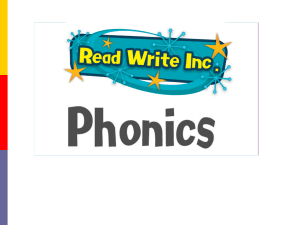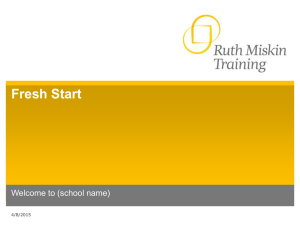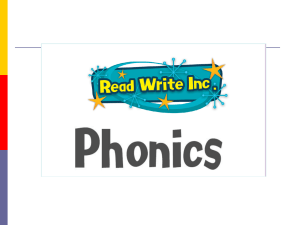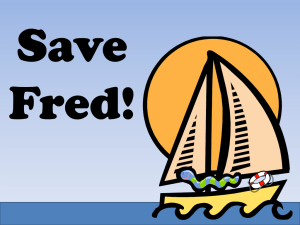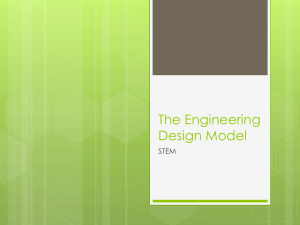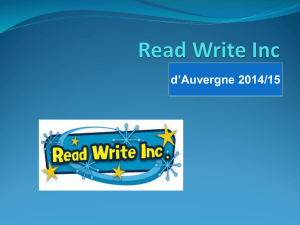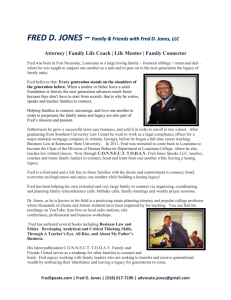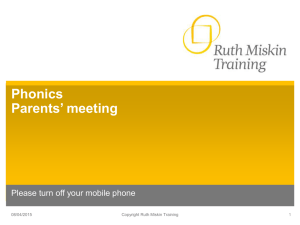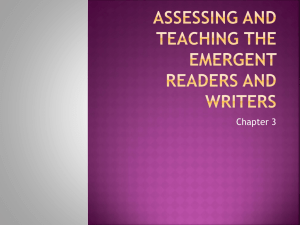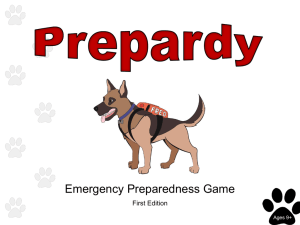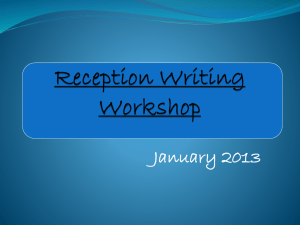FINS Key Stage 1 Information powerpoint
advertisement
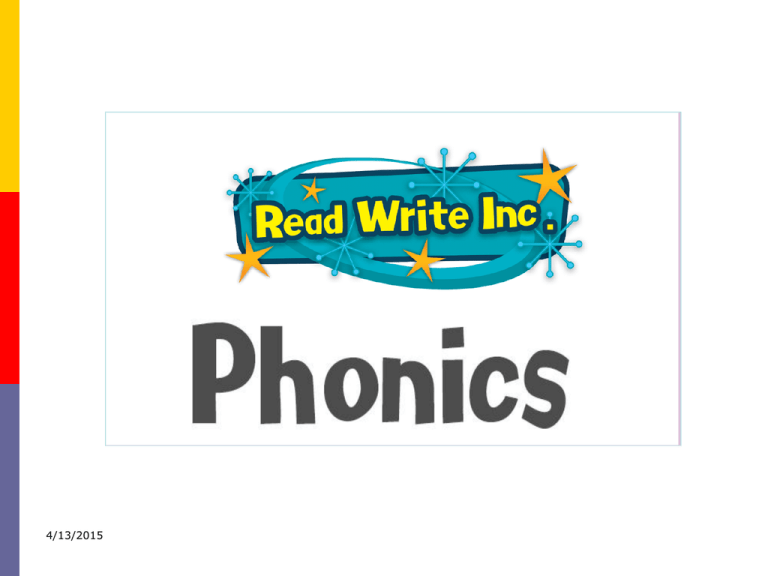
4/13/2015 We want all of our children to be confident and fluent readers. We want all of our children to love books and stories. We want all of our children to have a rich vocabulary of words. We want all of our children to talk with confidence about what they have read. We want all of our children to succeed. 4/13/2015 Read Write Inc Phonics is ... A rapid Learn to read programme so children can… Read to learn for the rest of their lives 4/13/2015 How does it work in the early stages? Children: Learn 44 sounds and matching letters/letter groups Learn to blend sounds to read words Read lots of specially written books This is decoding 4/13/2015 How does it work? Children: Talk a lot about what they have read to show they understand Listen to and discuss other ideas to deepen understanding This is comprehending 4/13/2015 Sounds All words are made up of sounds In English there are 44 4/13/2015 Graphemes A grapheme is a sound written down English has more than 150 graphemes A complex code! 4/13/2015 Chart This chart shows the most usual graphemes for the 44 sounds 4/13/2015 The complex English alphabetic code 4/13/2015 Learning the code Children learn a simple code first 4/13/2015 If English had a simple code spelling and reading would be much easier!! play mayk trayn cafay strayt wayt brayk green dreem kee hee happee light kight fligh Igh igh tigh blow smowk flowt gow mowst moon broot bloo groo 4/13/2015 c-a-t ch-a-t l-igh-t c-r-a-sh Fred... Fred helps children learn to read Fred can only talk in sounds... (Fred can only say c_a_t, he can’t say cat) We call this Fred Talk 4/13/2015 Fred... If children understand Fred they can blend orally Blending is needed for reading 4/13/2015 Copyright Ruth Miskin Literacy Fred... Fred helps children learn to spell as well! Children convert words into sounds They press the sounds they hear on to their fingers... We call this Fred Fingers 4/13/2015 Storybooks and Get Writing Books 4/13/2015 What does this look like? The children read and write for an hour each day in key stage 1, grouped according to their reading level. (The sessions will be much shorter in Reception) The children work closely with a partner to share ideas, teach, read, write and support. 4/13/2015 The children may be working with a different adult from their usual class teacher. Children who may need a little extra support to maintain progress will work with other adults at different times during the day. The children will be re assessed around every 8 weeks. 4/13/2015 So how can you help your child? By knowing the 44 pure sounds By knowing how to blend using Fred Talk for reading m_a_t By knowing how to do Fred Fingers for spelling 4/13/2015 And... By having fun with Fred Talk at home! “What a tidy r-oo-m!” “Where’s your c-oa-t?” “Time for b-e-d!” back, head, tum, leg, hand, foot, knee coat, hat, scarf, zip, sock, glove run, walk, skip, hop, fast, slow, stop, shop red, blue, green, black, knife, fork, spoon, plate, bowl, pan bread, cheese, meat, soup, jam, cake 4/13/2015 And... By reading to your child lots of lovely stories and asking lots of questions! Use these prompts to help you: What do you think happens next? What is that character thinking? What is happening? 4/13/2015 What is the character saying? What do you think that character is feeling now? And... By having a look at the parents’ pages on the web for tips and resources for supporting your child at home: www.ruthmiskinliteracy.com or www.oup.com (RWI resources are published by Oxford University Press) 4/13/2015 Reading at Home Reading record books are now be titled “reading we have shared.” In addition to commenting on your child's reading also tell us about books you have read together and exciting new words you have learnt. These will be reviewed by class teachers. Continue to choose books from the class box. A sticker has been put in the record book to tell you what level, but be flexible! 4/13/2015 You will also be informed what level your child is working on the Read, write inc program and this will tell you what sounds and words your child is learning to read/spell. Parents of children requiring additional support to progress in the program will be informed separately. 4/13/2015 Record books will not be stamped as they were previously. Your child will still be reading every day. Please ask your child’s class teacher or see Mrs Gallichan if you have any questions about the program. 4/13/2015 Thank you... Happy reading! 4/13/2015 Changes since OFSTED Following the publication of this Ofsted Report the Governing Body and the Senior Leadership Team have already created and implemented an Action Plan to address the issues raised. The Governing Body and all staff are working tirelessly to ensure that this school is able to meet the challenges ahead and Ofsted requirements to become a 'Good' school. Some of the many things we have put in place are: improvements to our marking and feed back to the children about their learning. Making what they are learning and how to achieve success much more clear and understandable. 4/13/2015 What are we learning? We provide differentiated Learning Objectives (the skill or information we want the children to learn)and Success Criteria (the steps the children need to follow to be successful)for all our children and we link this to their tasks by using printed stickers and sticking these in their books. We also have printed versions displayed on their tables as a reminder of what our expectations are for their learning. An example of this is as follows: To create a word bank of rhyming words. To write a sentence using rhyming words. I can think of words that rhyme with ‘ot’ and ‘at’ I can write a sentence using my rhyming words. I can check for capital letters and full stops. 4/13/2015 Marking and Feedback In Year 1 children are given a written next step usually linked to their success criteria or an obvious generic target e.g. using full stops correctly. In Year 2 the children have a two stars and a wish stamp used in their books, we link these to their success criteria and any generic target. You have used capital letters. You have found words that rhyme with ot – cot, got . Next time remember to check that you have used a full stop at the end of your sentences. We encourage the children to look at their last piece of work and we share with them what they have done well and what they still need to work on. 4/13/2015 Links to Marking codes As well as this we also put the appropriate code that shows how the child completed the work. I = Independent work G = Guided work S = Supported work V – Verbal feedback given C = Correction made We also put a tick next to the I can statements if the child has achieved the objective or a dash if they need to revisit that particular learning. 4/13/2015 Questions? We hope you have found this useful. If you have any questions, please feel free to ask your child’s teacher. 4/13/2015
